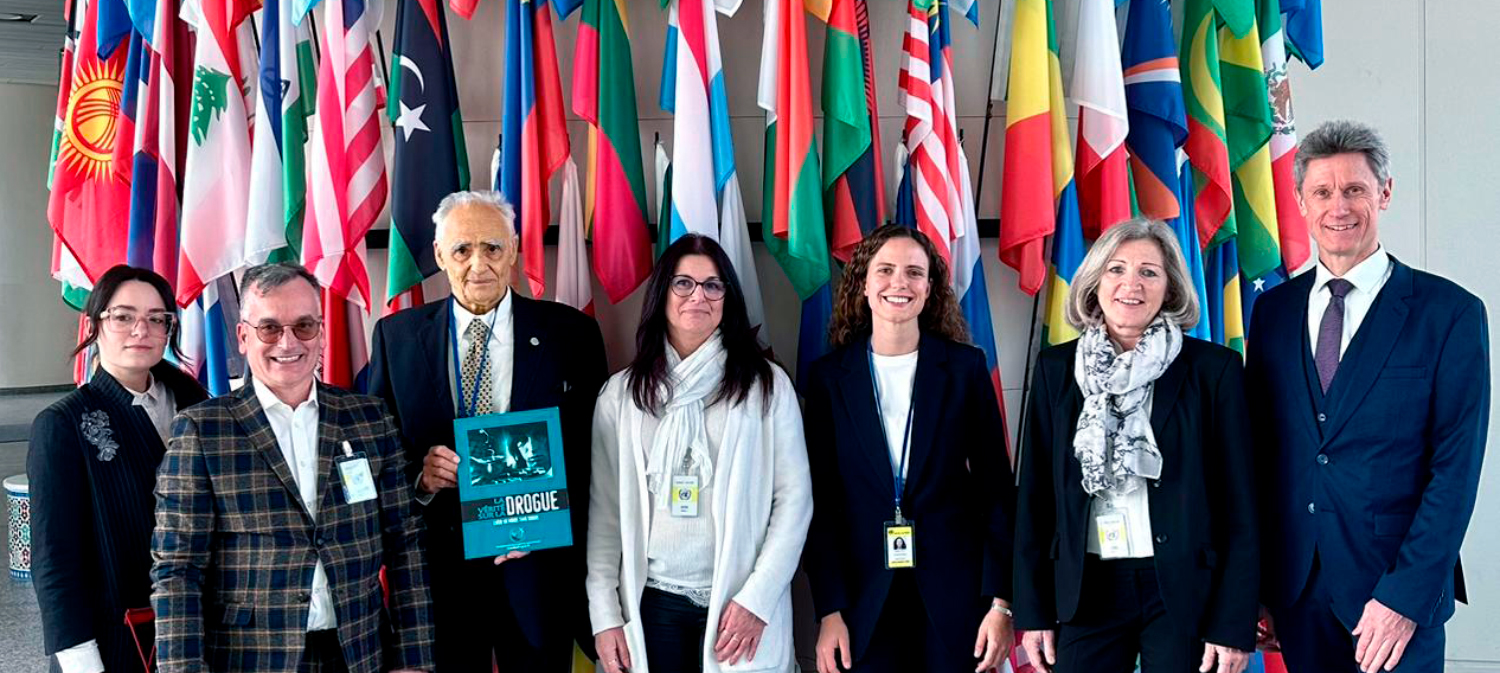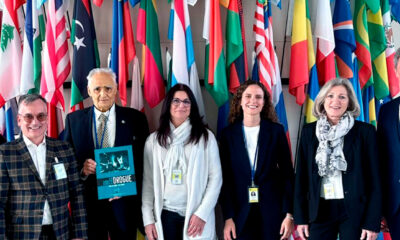Health & Society
Users of Antidepressants may suffer due to Doctors not knowing new Research and Guidelines

Research show people using antidepressants have problems withdrawing from the drugs due to doctors not knowing how to do it correctly, and that it can take months and years due to severe withdrawal effects. Adverse withdrawal effects often are not recognized or misdiagnosed as relapse.
Millions affected
When the SSRI antidepressants first appeared on the market they were presented as drugs that could solve life situations and with no problems related to them. In fact, manufacturers distributed numerous papers with description of withdrawal symptoms from the drugs as being “brief and mild”, based on studies conducted by the drug companies themselves which focused on people who had been on the antidepressants for only 8 to 12 weeks. The result has been that over the years both doctors and the general population have come to believe these drugs can not cause severe and long-lasting withdrawal symptoms on stopping them. And further that stopping the use of these drugs following a treatment would not be a problem.
What has not been the focus in research is that the longer people are on these antidepressants, the harder it is to stop and the more severe the withdrawal effects.
Research presented at this year’s European Psychiatric Congress show there are major problems related to this and research indicate that more than half will have problems stopping, amounting to millions in Europe being affected.
Antidepressants cause residual change to cell structure
The use of antidepressants causes changes to the body and its ability to regulate the use of its own neurotransmitters used to control numerous bodily functions. The result of this change of the cell structures is that once a user has stopped the antidepressants this can cause withdrawal effects and these can last months or years after the drug has left the system. The new research explain what many users have said they have felt for years.
Dr Mark Horowitz, an expert and Clinical Research Fellow in Psychiatry at the National Health Service (NHS) in England, presented extensive research findings that put a new light to the problem.
“When you stop the drug, let’s say months or years after the patient had been started on drug treatment following a stressful period in their life, the antidepressant is metabolized by the liver and kidneys in a few days or weeks. But what doesn’t change in a few days or weeks is the residual changes to the post-synaptic serotonin receptors and other systems downstream of this,” Dr. Horowitz told.
In studies on humans, there are changes to the serotonergic system that persists for up to four years after the antidepressants are stopped.
“In other words, you now have a system that is less sensitive to serotonin being exposed to normal levels of serotonin after the drug is removed. And overall, this could be seen as a low serotonin syndrome,” he clarified.
This of course is a very simplified version of what’s going on. There are many other neurotransmitters and downstream effects of these changes that may also persist for long periods after the drug is stopped. All of these changes also are likely to explain the wide-ranging and long-lasting symptoms that occur after stopping antidepressants.
Adaptation to the drug

The underlying problem that has often been neglected is that years of use has caused an adaptation to the antidepressant drug by the body and brain and this condition persists for longer than it takes the drug to be eliminated from the body, and that’s what causes withdrawal effects.
Dr Mark Horowitz explains why withdrawal effects last for more than a few days or weeks after the drug is out of the system, “it’s not the time taken for the drug to leave the system that determines the length of the effect. It’s the time taken for the system to readapt to the drug not being there that explains how long withdrawal symptoms can last for.”
Antidepressant withdrawal syndrome is a set of physiological symptoms that occur on stopping or reducing the dose of an antidepressant. They can manifest in either psychological or physical symptoms because these drugs affect so many bodily systems. They occur because adaptations to the brain caused by the drug take time to resolve.
Dr Mark Horowitz pointed out that it’s important to understand that withdrawal symptoms do not require addiction, all that is required is adaptation to the drug. This is often referred to as physical dependence. Physical dependence in pharmacological terms means the process of adaptation to appear to exposure to a drug that affects the brain, which is true for antidepressants (and, for example, to caffeine, which does not generally cause addiction but can cause physical dependence and therefore withdrawal effects).
As the SSRI antidepressants act on a neurotransmitter mechanism that influence not only mood but many bodily systems withdrawing from the drug after years of adaptation thus can cause strong reactions on many of these functions and their influence on one’s life.
Symptoms of withdrawal
There are dozens and dozens of possible effects that can be caused. Symptoms include dizziness, insomnia, impaired concentration, fatigue, headache, tremor, tachycardia, and nightmares. Withdrawal can even cause affective symptoms such as depressed mood, irritability, anxiety, and panic attacks.
“We know that these are symptoms of withdrawal and not just relapse (a return of someone’s underlying condition), because they have been found in studies of people who stopped antidepressants with no underlying mental health conditions,” Dr Mark Horowitz told. He mentioned examples such as people who are given these drugs for pain, for the menopause, and even in healthy volunteers.
There are other effects including an increase in suicide attempts in the two weeks after stopping antidepressants. It has been attributed to withdrawal effects itself because it’s too quick for relapse to explain this increase in symptoms. Dr Mark Horowitz further noted that they have also found in studies that while 30% of those who responded were suicidal before starting medication, 60% became suicidal after stopping so that this means for 30% of people they will experience being suicidal for the first time in their lives because of withdrawal effects.
The maybe most disturbing symptom from withdrawal of antidepressants, which often has been neglected, is a condition known as akathisia. Akathisia is a movement disorder usually caused by a psychoactive substance in which the individual generally will experience an intense sensation of unease or an inner restlessness that often prompts the patient to pace backwards and forwards and can be an intensely unpleasant experience. Dr Mark Horowitz noted that it is often recognised as a long-term consequence of antipsychotic exposure, but withdrawal from antidepressants and benzodiazepines and a variety of other psychiatric drugs can also cause the condition.
“It is the most horrible presentations that I see. People are pacing, they feel agitated, they feel terror. A lot of them are talking about suicide because it is a state in which you get no rest and no calm, often for weeks and sometimes longer,” Dr Mark Horowitz pointed out.
And it’s important as this condition is often misdiagnosed when people are presented to the emergency department as agitated depression, as mania, because many clinicians and others are unfamiliar with the fact that coming off these drugs can cause akathisia.
Withdrawal effects not recognized or misdiagnosed as relapse
Tens of thousands users of antidepressants from Europe every month are seeking information and advice from American peer support forums on how to come off their medications. Their stories are for many very similar.
The research group of Dr Mark Horowitz surveyed 1,300 of these. Three quarters of them said their doctor’s advice on withdrawing was unhelpful.
The major reasons where that the doctor had recommended a rate of reduction that was much too quick. And that the treating doctors weren’t familiar enough with withdrawal symptoms to have any advice, or they told the user that stopping with antidepressants would not cause withdrawal symptoms.
Dr Mark Horowitz indicated that doctors often still believe that withdrawal effects from antidepressants are “brief and mild”. And they do not know that withdrawal symptoms include anxiety, depressed mood, and insomnia.
“It’s easy to confuse with a relapse of depression or anxiety, especially when it’s in the clinician’s minds that withdrawal effects are brief and mild. Someone turns up with severe symptoms that are long lasting, it’s very hard to put the connection together,” Dr Mark Horowitz added.
Another disturbing fact is that withdrawal effects is not only related to antidepressants. “The same is true for coming off of all psychiatric drugs. Often the changes produced on the brain by psychiatric drugs can persist for months or years after stopping, which is why withdrawal syndromes can last a lot longer if it takes the drug to be eliminated from the body,” Dr Mark Horowitz pointed out.
Health & Society
Scientology’s Stand for Human Rights: A Look at the Budapest Protest Against Psychiatry

Press release. In Budapest, the Citizens Commission on Human Rights (CCHR) staged a protest during the European Psychiatric Association Congress, criticizing harmful psychiatric practices. The event featured a march and an exhibition, highlighting the need for substantial reforms in the mental health industry, as requested by United Nations and the World Health Organization.
A protest took place in Budapest challenging practices within the field of psychiatry during the European Psychiatric Association Congress. The Citizens Commission on Human Rights (CCHR) organized this demonstration to shed light on what they view as abusive or harmful methods in psychiatry. The event included a march and an exhibition aiming to bring attention to issues within the mental health industry and advocate for significant reforms.

The EPA Congress, held in April 2024 faced criticism for not taking action in response to recent directives from international bodies such as the UN and the World Health Organization. These directives called for an end to abusive psychiatric approaches, a matter that critics felt was not adequately addressed by the EPA’s theme of “Mental Health: Open and Inclusive.”
Led by CCHR Hungary, the protest began with a march through Budapest’s city center that concluded at the Budapest Congress and Exhibition Center, where the EPA Congress was being held. The march remained peaceful yet impactful, underscoring the protesters calls for reforms in practices.
After the march, CCHR Hungary presented an exhibit titled “Psychiatry; An Industry of Death.” This display, showcased in cities across the United States and Europe, utilizes records, videos and other types of evidence gathered over a span of more than five decades to scrutinize the field of psychiatry. The exhibit reveals the repercussions of psychiatric methods, including contentious treatments like brain operations and “electroconvulsive therapy” and how they have influenced various aspects of society including prominent artists and historical events.
During the exhibit’s unveiling, János Dobos, the head of CCHR Hungary, spoke fervently. “This material underscores the impact of psychiatry and the often harmful effects it has on individuals and society as a whole” stated Dobos. “It is essential for us to question these practices and advocate for treatment alternatives.”
Known for its intense content, the exhibition cautions visitors about its nature and allows entry to individuals only above 16 years old, unless accompanied by an adult. Its goal is to inform the public about events and current challenges in psychiatry while promoting a reassessment of how mental health issues are addressed and treated.

CCHR, the mental health watchdog organization founded in 1969 by psychiatrist Thomas Szasz in collaboration with the Church of Scientology, has consistently sparked attention and support due to its critical yet accurate perspective on psychiatry and its methods.
Recent incidents in Budapest have triggered a discussion on the involvement of psychiatry, in contemporary healthcare and the moral consequences of its methods. As discussions progress CCHR aims to persist in supporting what they see as changes to safeguard individuals rights and enhance mental health services globally.
Members of the Church of Scientology, the religion founded by L. Ron Hubbard, are dedicated to promoting rights, especially in the realm of mental health. Drawing inspiration from Mr. Hubbard’s teachings, they advocate for the safeguarding and acknowledgment of the rights of all individuals in healthcare, stressing the importance of holistic approaches to mental health care. This dedication forms part of a goal to make human rights a tangible reality across all aspects of life, including within the field of mental health.
Health & Society
The Drugs, the 67th CND and the FDFE, 20 Years of Good Practices of Drug Prevention for a Drug-Free Europe

In order to federate the different activities in the drug prevention fields of the hundred of Say No To Drugs European organisations and groups located in some 20 countries across Europe, the Foundation for a Drug Free Europe (FDFE) was created in March 2004, during the 47th Session of the Commission on Narcotic Drugs (CND) of the United Nations Office on Drugs and Crime (UNODC).

Since its creation (1946) the CND purpose is “to review, analyze the global drug situation, considering supply and demand reduction. And to take action through resolutions and decisions.” The CND is mandated “to decide on the scope of control of substances under the three international drug control conventions (1961, 1971 and 1988 Conventions).”
20 years of hard work

20 years later (March 2024), pursuing its Mission purpose, the FDFE is aware, since a decade, of the push of the high levels drug dealers whether they are “white-collars”, including Big Pharma (providing the precursors), the psychiatric field always complaining for “more resources” to get results, of all the NGOs money-centered in guise of “help”and concerned by the drug business with harm reduction, shooting rooms, making an illegal drug use legal, broadly using the “no-stigmatisation” to support them, highly using substitution treatments (legal drugs vs. the same illegal ones) but rarely promoting an effective rehabilitation not to say the prevention!
The first only basic action which can curtail the drug availability is the primary prevention at the youth level with the full support of a government enough concerned by the health of his population and of its developing youth, to take the correct decision about the drug expansion! There had been enough discussions years after years by the UNODC/Governments on the subject, but few realisation at the grass root levels despite the UNODC efforts. The worst is when governments are violating the Conventions and deciding to “legalize” some most common used drugs (to make more money…) but omitting to consider the following health expenses directly or not in relation with these drug use.
So, 2024 had been an opportunity for FDFE with the key support of the Fundacion para la Mejora de la Vida, la Cultura y la Sociedad having the ECOSOC status, to organize the side-event “20 Years of Good Practices of Drug Prevention for a Drug-Free Europe, at the UN, 21th March, Room MOE100, 14:10-15:00, during this 47th Session of the CND, always in Vienna (Austria) in the huge Vienna International Center (VIC).
In the following, we will strive to share with you the importance of prevention, education and illustrate what can be done at a responsible NGO level to revert the drug use trend among the youth.
About FDFE and the Drug Problem

FDFE is a non-profit NGO established in March 2004 (20 years ago!) and a partner of the Foundation for a Drug-Free World, freely providing the educational materials. FDFE is also member of different international organisations and had been invited across the world to present its educative materials of prevention, now translated in 17 languages!

The Drug Problem!
In all countries, from the richest to the poorest, drugs are challenging the health, weakening the education, flooding the criminal justice, threatening the social welfare and the economy, perverting the political system, generating huge wealth and power for the few and limitless harm and misery for the many, costing millions of lives and endangering the very sustainability of communities.
This alarming statement was written about 6 years ago. But despite the repeated warnings of UNODC, today all these points that have not been taken up seriously by the different authorities are unfortunately and durably affecting a still drug-affairs ignorant social fabric!
Our different European fields of activity:
Fully aware of the importance of acting at grass roots levels, directly concerned by the harming effects of drug use, FDFE developed many Drug Prevention Centers across Europe, and is currently working with a hundred of associations and groups located in: Austria, Belgium, Bulgaria, Cyprus, Czechia, Denmark, Finland, France, Germany, Greece, Hungary, Ireland, Italy, Luxembourg, Netherlands, Norway, Portugal, Romania, Slovakia, Spain, Sweden, Switzerland, Ukraine, UK, etc.
So, to harmonize the activities, educative materials were developed:
-14 factual booklets from the series The Truth About Drugs.
As a reminder, the first “educative booklet” had been written in the 1980ies in Switzerland by a colleague and already using scientific data. He was eager to warn the youngsters about the untold harming effects of the drug use. Based on its success, the idea had been progressively developed across the world to reach today the number of 14 booklets in 17 languages. They have even inspired some governments or be used by them to inform and protect the youth from the drug use!

-A Documentary DVD with testimonies from former drug addicts, and short Public Service Messages (as for TV channels).
-A full education package Guide with lessons for teachers and educators.
The final purpose is to empower the youth and young adults with scientifically proven facts, easily understandable. So, fully aware of the drug reality, away of dealers and marketing influences, they can responsibily make an informed decision.
FDFE, its associations and groups are definitely supporting the UN International Drug Control Conventions (1961, 1971, 1988), the Convention on the Rights of the Child (1989), the 17 Sustainable Development Goals (2015-2030), the activities of the European Monitoring Center (EMCDDA) and of the different agencies protecting the European borders.
During the Opening of the 67th Session of the Commission on Narcotic Drugs, 14th March 2024, the UNODC Director-General/Executive Director, Ghada Waly, again, clearly positioned the problem and the needed actions:
“The international drug control conventions have a timeless goal at their heart: the health and wellbeing of humankind.
“UNODC pledges to stand with you for a healthier, safer, and more prosperous future for all.”
“And we must invest far, far more in prevention, with a special focus on children and adolescents, who are more likely to develop disorders the earlier they begin drug use.”
Our Actions on the European Ground
To fit in the 50 min allocated time for the side event, 4 associations were selected to compose our panel:

1) Sag Nein Zu Drogen, Zag Ja Zum Leben (Austria).
This is a non-profit Organisation for drug education and prevention with the following goals: A society without abuse of drugs, alcohol and medication or other narcotics.

To raise public awareness about the destruction caused by drugs and to provide young people and adults with the facts so that they can make informed decisions about living a drug-free life.

This is achieved by contacting the youth and people where they are and making the real facts about drugs available to them.


2) Say No To Drugs (Belgium)



3) OUI à la Vie, NON à la Drogue (France)
In a recent interview (on Boulevard Voltaire – March 2024), Professor Xavier Raufer from Paris-Sorbonne, criminologist and specialist in social and political violence, terrorism and organized crime, considers that the recent attacks in Marseille (49 killed and 123 injured in one year) perpetrated by gangs and traffickers can be solved in 6 months! He said that the central question is not the one of means or even of political will, but of a currently missing political decision and the willing to face and to confront the 3 possible gangs weapons: intimidation, violence or assassination. X. Raufer said that they have in France the appropriate and national highly trained organization to solve this drug problem, in 6 months…

Indeed, the gangs will never dare to confront the State apparatus, especially since the French regalian State (those rights which belong exclusively to the State and cannot be delegated) is one of the strongest in Europe. The problem comes from the lack of orders…



4) Mondo Libero Dalla Droga (Italy)



In Fine,
Too often we are forgotting that all these psychotropic substances from plants, small animals, these “secondary matabolites” are only synthezised to defend the concerned species against any possible predator, including humans!
Being in direct contact with the population, youth, parents, teachers, institutions, and even former drug users and for many, how they went out of the dependance the hard way, we are deeply convinced that education is the real drug basic solution as already noticed 500 years ago by Leonardo da Vinci, and also later by Will Durant.

Starting by an early Prevention, that has to be continued along the curriculum, using progressive educative tools, and with a sane consensus from the Governments and Communities, this will enable to empower the youngsters on the harmful effects of illicit drug use.
Thus, aware, they can make an informed decision for a clean and successful life and realize their natural talents.
oOo
More on:
https://www.unodc.org/unodc/en/speeches/2024/cnd67-opening-remarks.html
Health & Society
Lia Kali on psychiatry: “a child tied to a bed, even for ten minutes… is torture”

It struck a chord with many when it was released a year ago. The song sheds light on the flaws and mistreatment prevalent in psychiatric facilities, drawing attention from both the audience and critics. Recently, Lia Kali shared her journey behind the song on the popular Spanish TV show “El Hormiguero” on Antena 3TV where she opened up about the personal struggles that inspired her music.
“UCA” serves as more than a musical piece, it stands as a powerful testament to the challenges faced by a young girl caught in a system that fails to provide genuine support and compassion, instead perpetuating oppression and cruelty. The song delves into a narrative of turmoil within a family dynamic that quickly spirals into violence, leading Lia Kali to seek refuge and eventually find herself confined in an adolescent psychiatric facility out of desperation.
Life in a psychiatric center was like torture, says Lia Kali
During her appearance on “El Hormiguero” Lia Kali shared how her freedom and autonomy were stripped away in the name of treatment. She painted a picture of conditions at UCA, where youths are often heavily medicated and kept isolated, resembling prisoners more, than patients. The song talks about how she was made to take medication without a diagnosis, highlighting the lack of empathy and care that worsened her suffering and that of other young people in similar circumstances.
The showman Pablo Motos asked Lia Kali “what was life like? I’ve never asked him…. I’ve never been with anyone who’s already been…. What was life like in there?”
And Lia answered categorically: “Torture. I mean…all of a sudden… that’s when you realize it and that’s also why, when I… when I asked myself whether I wanted to release this song or not, I realized that I did because I talked to people who still dealt with those centers and who still knew that the same practices were still being done, which ultimately are torture, which is tying people to the bed the same way for a week.
Kali described the inhumane and degrading practices that still persist in some adolescent crisis units, where young people are tied to beds and over-medicated, deprived of any human contact and basic understanding-treatments that she said are tantamount to torture.
“Are you going to tell me that you are trying to heal and help someone who is sick and what she needs is a fucking hug, and you won’t let her have any physical contact or talk to anyone and that your solution is to medicate her until she doesn’t even know who she is and have her tied to the bed without really caring about her diagnosis? I think that in Spain there is a big problem that what we do with people who bother is to put them to sleep. They dont care.” Lia Kali said.
She continued saying: “So I am ashamed and I am very sad that even today there are people who have relatives who have to go through similar tortures, tortures that are even forbidden in Europe, for example mechanical restraint, which is tying you to a bed, a lot of places in Europe, in which it is forbidden because it is understood as torture, which is what it is. I mean, to have a child, even a child tied to a bed, whether it is for an hour, ten minutes, it doesn’t matter, it is torture. It is a child… For God’s sake!””
Lia Kali’s impactful story in “UCA” has sparked conversations about the morality of psychiatric treatment for juveniles and the urgent need for changes within these facilities. The singer not only critiques the physical and emotional harm she endured but also condemns the apathy and systemic mistreatment by individuals who are meant to provide protection and healing.
Lia Kali’s appearance on “El Hormiguero” not just helped share her personal journey but also amplified the message of the song, resonating with audiences who may have been unaware of the reality faced by many adolescent crisis units, or those who suffered it and thought it “was normal”, or just did not find the strength to speak up. Her courage in sharing her story has been praised as a step towards demanding change, motivating others to speak up and take action against injustices and tortures in the mental health sector.
Psychiatry, treating patients “like dogs”
“What I found was a bunch of psychopaths who were there, probably underpaid, but treating us as if we were literally dogs. And in the UCA of Sant Boi I will say it and well, well, even enjoying it, for me the hardest thing was to say that I was there for a week, because after that week they realized that I did not have to be there. I got there because of something that made no sense at all and it was a doctor who did not feel like stopping to look at what was happening to me at home and why I was the way I was at that moment and sent me to a place where I did not belong.”
Evidencing a practice that is denounced a common in psychiatric hospital, Lia stated that she “was medicated without a diagnosis, right? I mean, it was like super crazy and I was aware of everything and I was like ‘how can there be such psychopaths here enjoying watching and laughing even when they do a restraint on someone and throw them on the [floor]?’. You know those…” speaking of when the hospital personnel were putting their knees on the chest of the patient, “Yeah, this happened to me. And I remember the face. I have that kid’s face etched in my mind, that half smile, of enjoying that and saying Loco, man, we have real psychopaths. How come there’s not a much bigger control in Spain? Fuck, they are our people, you know? They are also people. They’re people who feel, they’re people who love and they’re people who sometimes life has gotten the better of them. Sometimes they are just born this way, different. And I don’t think anybody deserves this. Hopefully, it will never happen to anyone in your family, no and hopefully and hopefully, it will change. And what I am saying here now, I hope that tomorrow there will be more control over these shitty centers where people are literally mistreated.”
“UCA” by Lia Kali transcends being a song, it serves as a call to provoke change emphasizing that art has a role, in addressing society’s darkest truths to inspire empathy. In a world where young voices are often disregarded or hushed, Lia Kali has found a potent means to ensure that her voice alongside others is acknowledged.
More about Lia Kali
According to the site of her agents:
“Lia Kali first discovered music within home and when she was just sixteen she rode her bike over all the jams in Barcelona. There’s where she made friend with lots of musicians and artists of the city and where she started to dialogue with reggae, jazz, soul and rap. Since then she has never stopped singing. Lia jumped from jams to other live stages of Barcelona with a bunch of projects, such as the Amy Winehouse tribute she leaded. That’s how she realised her love with the stage was much more than a first-glimpse love: the stage is her place to be. Eventually she got tired of singing others’ songs and started writing her own pieces and discovered the healing within it. Lia Kali writes the original soundtrack from her day by day stumbles and falls and released her first singles on 2022, going viral and reaching milions of streams and views in musical platforms and TikTok. On March 2023 she launches her very first album ‘Contra Todo Pronóstico’, where she summs featurings with the real who-is-who in the urban and rap Spanish scene such as Toni Anzis, Acción Sanchez, J Abecia, Zatu Rey from SFDK and even the top respected Colombian rapper Nanpa Básico. Lia Kali is nowadays most requested voices of the scene and with her debut album she makes one thing clear above all: any label falls short for her!”
-

 Sports5 days ago
Sports5 days agoMercedes celebrates Monza: “Goosebumps.”
-
Travel7 days ago
Venice 2024 review: ‘Babygirl’ – Nicole Kidman shines in sex-positive BDSM drama
-

 Health & Society7 days ago
Health & Society7 days agoMarathon of documentaries on Drug Prevention for International Day Against Drugs
-

 Sports7 days ago
Sports7 days agoUS Open, Lorenzo Musetti out of the tournament with many regrets
-

 Sports7 days ago
Sports7 days agoFiorentina closes the market with three strikes
-

 Sports4 days ago
Sports4 days agoCharles Leclerc at Monza outperformed even Michael Schumacher.
-

 Politics6 days ago
Politics6 days agoEuropean Parliament begins its 10th term
-

 Sports4 days ago
Sports4 days agoUS Open, Jannik Sinner sweeps Tommy Paul in three sets: he’s in the quarters





















